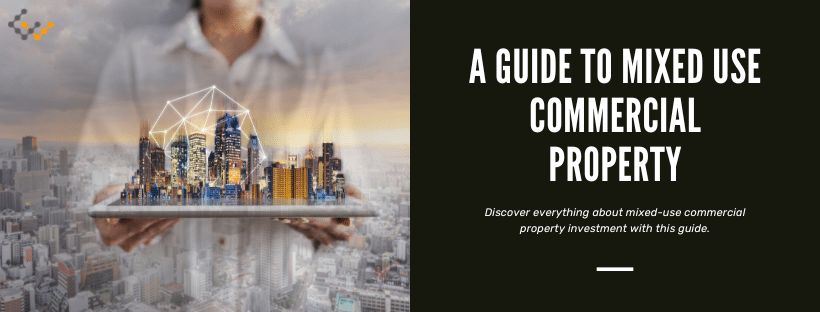A Comprehensive Guide to Mixed-use Commercial Property

Diversification has an important place in any long-term real estate portfolio. Commercial real estate offers one way to diversify if your portfolio is overexposed to small residential, and there are many opportunities to diversify within commercial real estate. One of the most effective is mixed-use commercial property.
What is Mixed-Use Commercial Property?
Mixed-use commercial property is a development that combines at least two different uses, like residential, commercial, or industrial, in a single property. Properties are considered mixed-use regardless of their size, as single buildings, multi-building developments, and even entire neighborhoods are mixed-use if they have more than one use. Some examples of mixed-use properties are:
- Buildings with retail space on the first floor and apartments/condos on the upper floors
- Stores with a cafe or restaurant space within the actual store
- Strip malls with retail stores, restaurants, services, and sometimes other tenants
- Office buildings with small food service and/or retail businesses for workers
- Developments with office space, apartments, food service, and stores
Types of Mixed-Use Commercial Property
As the examples show, there are various types of mixed-use commercial properties. Each is characterized by a unique blend of uses:
- Vertical Mixed-use Developments: This is the most common form and involves different uses stacked vertically in a single building. The ground floor typically hosts retail or restaurants, with residential or office spaces above.
- Horizontal Mixed-use Developments: Here, different uses are spread horizontally across different buildings within a single plot. This type often appears in suburban areas where there’s more space for sprawling development.
- Neighborhood Mixed-use Developments: These are larger projects that span across entire neighborhoods or districts, involving a balanced mix of residential, commercial, and public space.
- Transit-Oriented Developments – These mixed-use properties are built around major transportation hubs like train stations or bus terminals. They offer easy commuting, which makes them attractive for residential and commercial tenants alike.
Weighing the Pros and Cons of Mixed-Use Commercial Investments
Before jumping into an investment, it’s crucial to understand the potential advantages and drawbacks.
Pros of Commercial Mixed-use Property
- Diversified Income Streams: With a mix of residential, commercial, and sometimes industrial tenants, investors have multiple sources of income, reducing the risk associated with dependence on a single tenant type.
- Sustained Demand: By offering a mix of living, working, and leisure spaces, mixed-use properties cater to the evolving preferences of urban dwellers who value convenience and proximity.
- Community Creation: Mixed-use properties often generate vibrant communities, which can increase property value over time and create a more stable tenant base.
- Enhanced Value Retention: Mixed-use properties tend to maintain their value well, even in turbulent market conditions, due to their diversified tenant base and continuous demand.
Cons of Commercial Mixed-use Property
- Complex Management: Given the varied uses, managing mixed-use properties can be challenging, often requiring expertise in residential, commercial, and sometimes industrial property management.
- Higher Initial Investment: These properties are often larger and more expensive than single-use properties, which could make them less accessible to some investors.
- Potential for Conflict: With diverse tenants come diverse needs and potential conflicts, such as noise complaints from residential tenants about commercial tenants.
- Regulatory Challenges: Mixed-use properties may face more regulatory issues, including zoning and permit restrictions, than single-use properties.
How are Mixed Use Properties Financed?
Mixed-use properties can be financed in a variety of ways. Traditional bank loans, commercial real estate loans, and government-backed loans like those from the Small Business Administration (SBA) or the Federal Housing Administration (FHA) are commonly used.
Equity financing from private investors or Real Estate Investment Trusts (REITs) can also be an option, although these are frequently more difficult to obtain and may not have as favorable terms (especially compared to SBA and FHA loans).
Investors needing a commercial loan for mixed-use property should look at all their loan options. There’s no one loan program that’s perfect for all properties — just as these properties are diverse, so are the commercial loan programs for mixed-use properties.
5 Things You Should Look for Before Investing in a Mixed-Use Commercial Property
When considering a mixed-use property investment, look at these key areas:
- Location: As with any real estate investment, location is crucial. Ensure the property is in a high-demand area with solid growth potential.
- Tenant Mix: Analyze the tenant mix to ensure it’s compatible and will cater to the local market demand.
- Zoning Laws: Familiarize yourself with local zoning laws to avoid potential legal complications.
- Management Requirements: Consider the resources you’ll need for managing the different aspects of the property effectively.
- Market Analysis: Beyond assessing the property itself, it’s important to understand the wider market conditions. This includes trends in the residential, commercial, and potentially industrial real estate markets, as well as overall economic conditions in the property’s location.
Is Mixed-Use Property Investment For You?
Investing in mixed-use property is not for everyone. It requires a substantial upfront investment, a comprehensive understanding of different real estate sectors, and the ability to navigate the complexities of property management. However, for those who can navigate these challenges, the diversified income stream and increased demand can make it an especially profitable investment.
If you’ve previously held investment properties or have an experienced partner, mixed-use property investment may very much be for you.
Wrapping Things Up
Mixed-use commercial properties present a unique opportunity in the world of real estate investment. They offer the potential for diversified income streams, sustained demand, and community creation, although they also come with their share of challenges.
As with any investment, it is essential to do your homework, understand your financial capacities, and consult with experts when necessary. Ultimately, the potential benefits of mixed-use properties can far outweigh the challenges for those ready to embrace them.

